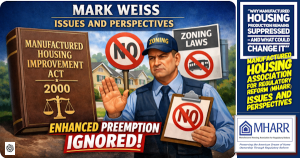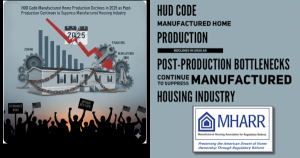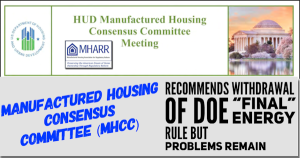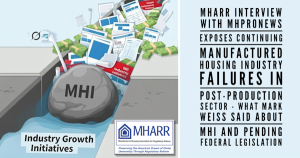Supreme Court Case Could Significantly Advance Manufactured Home Producers’ Interests in Nation’s Capital
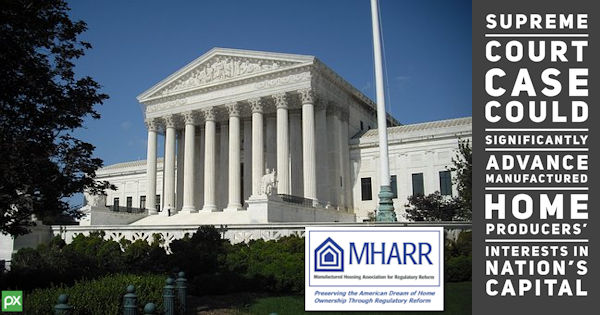
MAY 2, 2023
FROM: MHARR
RE: SUPREME COURT CASE COULD SIGNIFICANTLY
ADVANCE MH PRODUCERS’ INTERESTS IN NATION’S CAPITAL
The United States Supreme Court has accepted for review later this year, a case that could significantly alter the landscape of federal regulatory law, including critical matters that directly impact the comprehensively federally-regulated manufactured housing industry.
The case, Loper Bright Enterprises v. Raimondo, which the court voted to accept on May 1, 2023, involves a legal concept known as “Chevron deference,” and provides an opportunity for the Court to either eliminate, restrict, or clarify that doctrine. Chevron deference, first enunciated by the Supreme Court in Chevron USA v. Natural Resources Defense Council (1984), means that a court reviewing federal agency regulatory action will defer to an agency’s interpretation of a controlling statute if the statute itself is found by the court to be “ambiguous.”
For example, when HUD (in concert with its entrenched contractor) adopted current Subpart I procedures, including regulations, policy statements, “guidelines,” and other sub-regulatory criteria that have continually bedeviled industry production, MHARR – in the absence of Chevron deference – would, in 1985, have judicially challenged those actions. As MHARR members are aware, though, the Association chose not to proceed in that manner, because of the adoption of Chevron judicial deference just a year before.
If Chevron deference were overruled, however – or significantly limited — the likelihood of judicial relief concerning many regulatory issues affecting the industry would be enhanced, meaning that agencies would have to confront an increased likelihood of credible litigation over regulatory decisions and actions. This, in turn, would enable MHARR to more aggressively protect, defend and advance the views and interests of manufactured housing producers in Washington, D.C.
Given the importance of this case and its potentially far-reaching effects on the HUD Code manufactured housing industry, MHARR will continue to closely monitor this action, and will report to you further as developments warrant.
Manufactured Housing Association for Regulatory Reform (MHARR)
1331 Pennsylvania Ave N.W., Suite 512
Washington D.C. 20004
Phone: 202/783-4087
Fax: 202/783-4075
Email: MHARR@MHARRPUBLICATIONS.COM
Website: manufacturedhousingassociation.org
MAY 2, 2023
FROM: MHARR
RE: SUPREME COURT CASE COULD SIGNIFICANTLY
ADVANCE MH PRODUCERS’ INTERESTS IN NATION’S CAPITAL
The United States Supreme Court has accepted for review later this year, a case that could significantly alter the landscape of federal regulatory law, including critical matters that directly impact the comprehensively federally-regulated manufactured housing industry.
The case, Loper Bright Enterprises v. Raimondo, which the court voted to accept on May 1, 2023, involves a legal concept known as “Chevron deference,” and provides an opportunity for the Court to either eliminate, restrict, or clarify that doctrine. Chevron deference, first enunciated by the Supreme Court in Chevron USA v. Natural Resources Defense Council (1984), means that a court reviewing federal agency regulatory action will defer to an agency’s interpretation of a controlling statute if the statute itself is found by the court to be “ambiguous.”
For example, when HUD (in concert with its entrenched contractor) adopted current Subpart I procedures, including regulations, policy statements, “guidelines,” and other sub-regulatory criteria that have continually bedeviled industry production, MHARR – in the absence of Chevron deference – would, in 1985, have judicially challenged those actions. As MHARR members are aware, though, the Association chose not to proceed in that manner, because of the adoption of Chevron judicial deference just a year before.
If Chevron deference were overruled, however – or significantly limited — the likelihood of judicial relief concerning many regulatory issues affecting the industry would be enhanced, meaning that agencies would have to confront an increased likelihood of credible litigation over regulatory decisions and actions. This, in turn, would enable MHARR to more aggressively protect, defend and advance the views and interests of manufactured housing producers in Washington, D.C.
Given the importance of this case and its potentially far-reaching effects on the HUD Code manufactured housing industry, MHARR will continue to closely monitor this action, and will report to you further as developments warrant.
Manufactured Housing Association for Regulatory Reform (MHARR)
1331 Pennsylvania Ave N.W., Suite 512
Washington D.C. 20004
Phone: 202/783-4087
Fax: 202/783-4075
Email: MHARR@MHARRPUBLICATIONS.COM
Website: manufacturedhousingassociation.org

